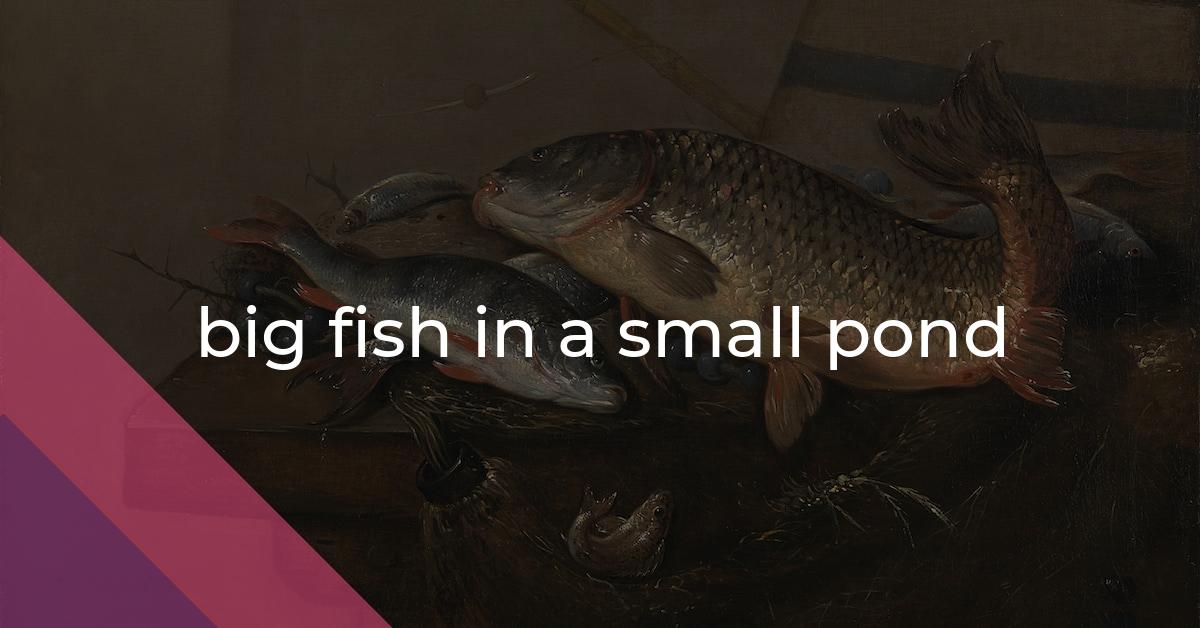big fish in a small pond: Idiom Meaning and Origin
What does ‘big fish in a small pond’ mean?
When someone is a "big fish in a small pond," it means they are important or successful in a small or limited environment, but may not have the same significance or recognition in a larger or more competitive context.

Idiom Explorer
The idiom "legend in one's own lunchtime" refers to a person who is only considered important or famous within a specific limited context or group, but lacks recognition or respect in a broader or more significant setting.
"Large and in charge" is an idiom that means someone is in a position of power or authority, and they are confident and capable of handling their responsibilities.
An idiom meaning an individual or thing that is the most impressive or influential among others in a given field or situation.
The idiom "in no small part" indicates that something or someone contributes significantly to a particular outcome or situation, usually emphasizing the size or importance of their contribution.
"Hit the big time" is an idiom that means achieving great success or fame, often referring to someone who becomes very successful in their career or achieves a high level of recognition. It implies reaching a significant, noteworthy position or achieving a major breakthrough in one's life or profession.
The idiom "fish out of water" refers to a person who feels uncomfortable or out of place in a particular situation or environment.
The idiom "fish in troubled waters" means to take advantage of a difficult or chaotic situation for personal gain or advantage.
The idiom "everybody who is anybody" means that only the most important or influential people are included or recognized in a particular group or situation.
The idiom "drop in the sea" means a very small or insignificant amount in comparison to a larger whole.
The idiom "drop in the pond" means a small, insignificant action or event that has a minimal impact or influence on a larger situation or problem.
Decoding the Enigma
The idiom "big fish in a small pond" is used to describe a person who holds importance or influence within a limited or relatively unimportant context. In other words, this phrase suggests that an individual may appear more significant than they truly are when compared to a larger, more competitive environment.
The origin of this idiom can be traced back to the late 19th century. While the exact source is difficult to pinpoint, it is believed to have emerged from the common observation of fish in a body of water. In a small pond, a larger fish standing out among smaller ones would naturally appear more prominent and dominant. This concept was then metaphorically applied to human situations, particularly in the context of social hierarchies.
The idiom serves as a reminder of the importance of considering the relative scale and scope of an individual's achievements or skills. It emphasizes the need to evaluate their reputation within the context of a small or specialized community, as it may not necessarily translate to success or recognition on a larger scale.
When we explore the idiom "big fish in a small pond," we gain insight into the dynamics of human hierarchies and the role of context in shaping perceptions of importance. This expression captures a universal concept, and its fluidity allows for a range of interpretations and applications. It reminds us to question the scale of our own successes and to remain open to the possibilities that exist beyond our immediate surroundings.
However, it's important to note that the idiom "big fish in a small pond" is related to other idioms, such as "big fish" and "drop in the sea." These idioms share a common thread of describing the significance or impact of an individual within a specific context.
When we refer to someone as a "big fish," we imply that they hold a position of importance, authority, or influence. This could be within a particular field, industry, or organization. The "big fish" is seen as someone who is highly respected or admired for their achievements or position.
On the other hand, the idiom "drop in the sea" conveys the idea of being insignificant or having little impact within a larger or more competitive environment. It suggests that one's contributions or accomplishments are small and easily overshadowed by the sheer size or scale of the surroundings.
By combining these two idioms with the idiom "big fish in a small pond," we can better understand the concept being conveyed. A person who is a "big fish in a small pond" holds importance or influence within a specific and limited context. They may be seen as a "big fish" within that smaller community or group, but when placed in a larger or more competitive environment, their significance or impact may be diminished, much like a "drop in the sea."
This relationship between the idioms highlights the notion that we need to consider both the size of the pond and the larger body of water when evaluating someone's importance or achievements. While being a "big fish in a small pond" may have its merits and offer a sense of recognition within a specific group, it's crucial to recognize that the pond itself may not be representative of the wider world.
It's essential to remain open-minded and aware of the context in which we assess ourselves and others. Recognizing the limitations and potential biases of a small pond can help us gain a broader perspective and appreciate the vastness of the sea.
So, the next time you hear the idiom "big fish in a small pond," take a moment to reflect on the significance of context and its impact on our perceptions. Consider the related idioms of "big fish" and "drop in the sea," and remember to question the scale of your own achievements and the scale of the pond you find yourself in.
After all, the world is vast and ever-expanding, and there is always room for growth and exploration beyond the confines of a small pond.
Example usage
Examples of how the idiom big fish in a small pond can be used:
- He was a big fish in a small pond at his old company, but now that he's working for a larger corporation, he's just another employee.
- She decided to stay at her hometown college because she liked the feeling of being a big fish in a small pond rather than getting lost in a big university.
- After being the star player in high school, he struggled to make an impact on the professional basketball team. It was a tough transition from being a big fish in a small pond to a small fish in a big pond.
More "Metaphorical" idioms



